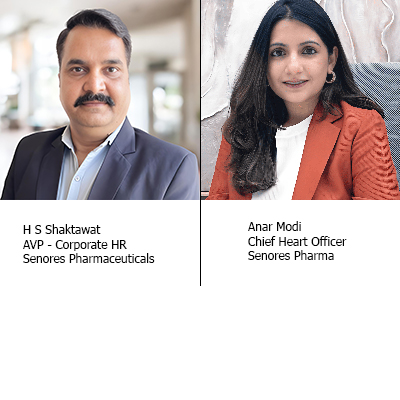Skilling Youth: An Imperative for the Healthcare and Pharma Industry | Anar Modi | Chief Heart Officer | Senores Pharma and H S Shaktawat | Associate Vice President – Corporate HR | Senores Pharmaceuticals
 It usually begins with excitement. A freshly graduated candidate walks into their first job in pharma or healthcare, degree in hand and full of ambition. But as the days go by, a sobering reality sets in: the theories they studied don’t always translate into the decisions, pressures, and pace of real-world work.
It usually begins with excitement. A freshly graduated candidate walks into their first job in pharma or healthcare, degree in hand and full of ambition. But as the days go by, a sobering reality sets in: the theories they studied don’t always translate into the decisions, pressures, and pace of real-world work.
They aren’t alone. In India’s growing healthcare and pharmaceutical sectors, thousands of young professionals feel unprepared. This is not due to a lack of intelligence, but because they lack industry-related skills. This gap is not a sign of individual failure, but a challenge that needs to be tackled system-wide. It’s time to address it with urgency, empathy, and new ideas.
When Qualifications Alone Won’t Cut It
Every year, the industry welcomes thousands of freshers—eager, driven, and academically accomplished. Yet, many of them quickly find themselves struggling to bridge the gap between classroom theory and real-world practice. This isn’t a question of talent or intelligence—it’s a matter of exposure and readiness. What we’re seeing is a growing mismatch between academic training and the practical skills employers urgently need.
If India truly aims to lead the global healthcare and pharmaceutical landscape, we must pause and ask: are we equipping our young professionals with more than just degrees? Are we giving them the tools to navigate complexity, adapt to industry challenges, and contribute with confidence from day one?
Making Learning a Habit, Not a Headache
Skill push only works when it isn’t a last-resort scramble. Instead, growth must pulse through the company culture the same way profits do. Role-targeted, tech-friendly, future-minded courses can turn green recruits into nimble pros who surf industry change, not sink under it.
The upside goes beyond numbers; it builds real loyalty. When people see the boss investing in their growth, they link their career dreams to the firm’s mission. Training stops being a chore and starts feeling like a shared adventure.
Understanding Growth Expectations of Employees
Equally important is recognising what employees want for themselves. Spotting skill gaps should stretch beyond annual reviews, it means watching how people adapt, listening to their hopes, and nudging learning at every point in their career journey.
This task grows crucial when someone returns after months-or years-away due to maternity, illness, or personal matters. Coming back to work should not feel like hitting reset. With quick refresh sessions, steady mentoring, and plain emotional support, we can lift confidence and smooth the path back in.
The Evolving Skillset for Modern Healthcare
Today’s pharma professionals need more than diplomas on the wall. As AI, telemedicine, and never-ending data streams reshape the field, comfort with technology, quick adaptability, and teamwork across disciplines have become hard requirements.
Groups such as R&D, regulatory, and quality assurance are changing fast. When young specialists in those teams receive constant learning, they’re better equipped to contribute fresh ideas and drive meaningful impact.
A People-First Mindset in Learning
Building skills ought to feel personal, not like another box to tick. When we infuse empathy into learning, growth stops being a dry transaction. People then sense that they matter for the person they are becoming, not only for the task they complete today.
This kind of warmth matters most when someone is navigating change or stepping into something new. A space that acknowledges their worries while gently encouraging growth helps build trust—and keeps people engaged for the journey ahead.
Conclusion: Skilling Belongs to All of Us
For lean organisations, rolling out big formal programmes can seem impossible. Collaboration, therefore, becomes vital. Public agencies, colleges, and industry networks can pool tools and funding, making shared skilling not only feasible but smart.
The goal is more than competence, it is helping each person flourish at work and beyond.When we devote time to capability and sprinkle in genuine care, we strengthen our teams and, in turn, the healthcare system that serves every community.


